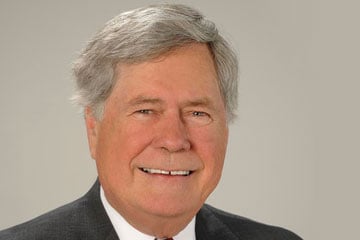
Thunder Bay lawyer Ross Murray, who was recently promoted to incoming chair of Lakehead University’s Board of Governors, says he is “very upset” about the inquiry into the former interim dean of the Bora Laskin Faculty of Law.

Thunder Bay lawyer Ross Murray, who was recently promoted to incoming chair of Lakehead University’s Board of Governors, says he is “very upset” about the inquiry into the former interim dean of the Bora Laskin Faculty of Law.
Angelique EagleWoman, who had served as the law school’s dean since January 2016, resigned in April 2018 citing “systemic discrimination.” Following the departure of EagleWoman — the first Indigenous dean of law at a Canadian university — her interim replacement, Justice Patrick Smith, also left the school.
Justice Robert Pidgeon, vice chairman of the Judicial Conduct Committee of the Canadian Judicial Council said this week that Justice Patrick Smith “engaged in misconduct by accepting a position as interim dean without considering the possible public controversy associated with the reaction from the chiefs of First Nations and without considering the political environment or the potential effect on the prestige of judicial office.”
Pidgeon wrote that the matter might be serious enough to warrant Smith’s removal from office, and referred the matter to a review panel, noting a “scathing” reaction from First Nations leaders who “criticized the lack of prior consultation and failure to follow the recommendations of the national advisory committee on aboriginal issues” and “called on the university to rescind the appointment.”
“These are serious, litigious issues that have been, and can further be, subject of public debate,” Pidgeon wrote. “Justice Smith’s role may be circumscribed, but it goes beyond a purely ceremonial role and is one of leadership within the university, one that takes him away from his judicial duties.”
Murray says he finds it “saddening and tragic” that the CJC would examine removing Smith from the bench, after Smith had received the approval of the chief justice of Ontario’s Superior Court of Justice, as well as the Minister of Justice and Attorney General of Canada.
“We are upset about this. We don’t understand why the Canadian Judicial Council would want to take this step. It’s extremely difficult for Justice Smith and his family to be put through this. He was actually doing our faculty of law a big favour by agreeing to do this, and Chief Justice [Heather] Smith and the Minister of Justice, Jody Wilson-Raybould, were doing us a big favour by allowing him to take a sabbatical,” Murray tells Legal Feeds.
Murray was elevated to the position of chair on Sept. 27, after he joined the board in 2014 and previously served as the board’s vice chair. The university said in its announcement that Murray, now retired from the practice of law, was “actively involved in initiating and developing the original Lakehead’s Faculty of Law proposal.” Murray, an ex-officio bencher, worked with the Law Society of Ontario on Lakehead’s law school proposal, the announcement said, and in addition to his role as past president of the Thunder Bay Law Association.
“It was important for the law school to have someone like [Patrick Smith] take over as a leader and assume a leadership role. And so to think that — having done that, and having had quite a bit of success in a short period — he would then be subject to a review that might lead to his removal from the bench, is upsetting. I think it’s not only true for me and Lakehead University but also for our community here in Thunder Bay,” Murray says.
Murray was not the only one to speak out on the issue. The Canadian Superior Courts Judges Association said in a statement that while it “does not normally take a position on the merits of any individual complaint as to the conduct of a judge …. the association feels compelled to say that the complaint against Justice Patrick Smith is an exception.” The CSCJA says it will seek leave to intervene at Federal Court so support the position that Smith had been “careful and thoughtful” in accepting the position of law dean, which he did “in the public interest, in order to assist a new law school that was in great difficulty.”
The CJC says the review panel — three CJC members, one other judge and one layperson — will make its decision public when the review is complete, and that the CJC does not intend to comment further until that time.
“Council believes that all judges, and the public alike, will benefit from greater clarity regarding the permissible scope of activities for judges outside their normal judicial duties,” Norman Sabourin, CJC’s executive director and senior general counsel, said in the press release.
Meanwhile, Lakehead’s law school — which had expected Smith to stay on as dean for six months — is still on the search for a leader.
“We have to find a new law dean,” Murray says. “Now, I guess we need move more quickly…but this takes time.”